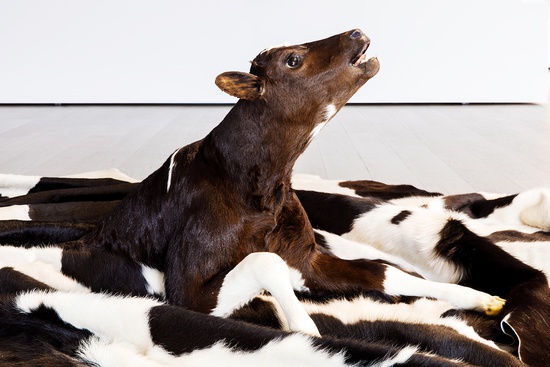ACP Collaborative Worldmaking Course | Quarantine Edition
POSTHUMANIST PERSPECTIVES
ANNIHILATION (2018) by Alex Garland
Wed. 1st April - 20.15
Netflix party (you will receive the link 30 min. before) with Zoom discussion after the screening
Of course you can watch the movie at another time as well - you'll find it on Netflix.
For a (very short) discussion of Annihilation as one of the few examples of queer futurism in mainstrain science fiction cinema, check out this mini-lecture (6:30 onwards):
ANIMALIA
Garage Rotterdam
Visit the exhibition online (click on this text box).
Pets; who doesn’t have or hasn’t ever had them? They bring out the most loving and altruistic side of many people. We have been domesticating animals for thousands of years. Even wild animals could be cuddled and controlled, but which we chose to pet and which to eat was a matter of culture and Zeitgeist.
The exhibition portrays a fanciful animal kingdom full of mythology, voodoo, humour, historical collections, and performances. The artists invite us to look at the world stage with or through the eyes of different protagonists; animals. What would we see if we were to abandon the human perspective? Could we identify with a different perspective, with that of an animal?
We already speak of the Anthropocene era, a period of time in which the influence of mankind and the effect of its interventions on the earth and our climate have become manifest and irreversible. These are the consequences of a human-centred worldview and human activities. This worldview is slowly shifting. Initiatives have been set up that depart from human centralism, enabling people to speak and behave on behalf of animals and nature. Examples include the Dutch Party for the Animals (in Dutch: PvdD) and The Embassy of the North Sea.
Despite several encouraging developments, from which we can deduce that a change is taking place regarding the relationship between nature and animals, we cannot deny the less appealing aspects of our love for animals. In addition to showing a happy mix of people and animals, Animalia also illustrates our ongoing dominant and superior behaviour. The consumption, preservation and domestication of animals is still the norm. Our love of animals is contradictory: some we love as pets, and others we prefer to keep out of sight, so they can be slaughtered at the end of a short and unpleasant life – very recently there have been still more horrific stories about Dutch slaughterhouses – only to end up as meatballs.

Science Fiction novels:
Nnedi Okorafor - Lagoon (2016)
Octavia E. Butler - Dawn (1987)
Read one, or both (contact Tamara for access to e-books)
POSTHUMANIST PERSPECTIVES
Vinciane Despret (2012) - What would animals say if we asked the right questions?
Cary Wolfe (2010)
What is posthumanism?
- Introduction (tough read)
1. Choose a letter from the alphabet.
2. Read the corresponding chapter
READINGS
ONLINE EXHIBITION
FILM SCREENING
We engage in worldmaking practices every day - we create and maintain worlds in the language we use, how we interact with each other, in the daily, seemingly insignificant, decisions we make. Worldmaking happens through the systems and structures that surround us, in which we participate, and by doing so reinforce. We can also choose to refuse to participate in those systems and structures, and through critical reflection and other ways of being and doing create alternative worlds.
We can find attempts at changing the way 'the human' is conceptualized in relation to the world at large in posthumanist theories and practices. Across a plethora of definitions, we can describe the aim of posthumanist thought as questioning the position and nature of the human in times of technological advancement and ecological crisis. In this online edition of the Collaborative Worldmaking course, we will imagine what a posthumanist world could like, with the help of the arts and humanities (film, contemporary art, literature and philosophy).
On this page you will find several sources and links. Over the next couple of weeks, try to get an understanding of what a posthumanist world could mean and look, feel, smell, sound like. In the week of 22 April, we will work together on imagining a world (or worlds) in which human beings are no longer at the top of the hierarchy of the living and non-living. How exactly we will do this I'd like to leave open for now - once you have explored the sources some more we can start discussing how we want to approach this.
For more sources check out: https://growingsyllabi.hotglue.me/?World-Making+Workshop/
Have fun!
On the Posthuman (2017)
(short article)
The Palgrave Handbook of Posthumanism in Film and Television (2015)
Dave Crewe (2018). The Dangerous Biology of Annihilation.
How Bullshit could change the world or...